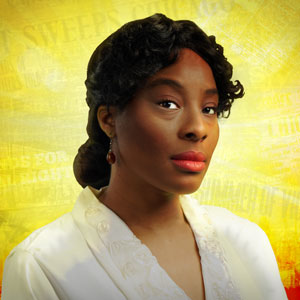
 *** “The Prodigal Daughter” by Joshua Allen is a story about black culture in the early 20th century and displays the vulnerability of each of the characters as they react to the mainstream society’s underlying racism and sexism and the grim reality of “knowing one’s place.” The show portrays a case study of one African American family living on Chicago’s South Side and is a snapshot of how they get through one 24-hour day in July of 1919.
*** “The Prodigal Daughter” by Joshua Allen is a story about black culture in the early 20th century and displays the vulnerability of each of the characters as they react to the mainstream society’s underlying racism and sexism and the grim reality of “knowing one’s place.” The show portrays a case study of one African American family living on Chicago’s South Side and is a snapshot of how they get through one 24-hour day in July of 1919.
This is the story of Virginia Bass a/k/a Ginny (Stephanie Mattos), a 24-year-old woman who returns to her hometown of Chicago after an absence of several years. When she visits her family home, she wants to show everybody how different she is from the person who originally left town. Nowadays, she is a rising star as a salesperson who earns her own income while working side-by-side with her co-worker, a white man named George Oakley (Stef Brundage). Together they demonstrate the latest modern invention: an electric vacuum cleaner. The show opens with both of them extolling its virtues, and George says, “I’ve never shown this to four people at the same time.” The people in the parlor include Ginny’s widowed father John Bass (Bradford Stevens), her 15-year-old sister Daisy (Sól Fuller), her aunt Lottie Dickerson (RJW Mays), and a close friend of the family, the newly minted reverend Eugene Maxwell (Bryant Hayes).
The chosen date for Ginny’s reunion happens to coincide with the start of race riots throughout several U.S. cities during the summer of 1919. The Chicago riots began on the South Side when militant whites sought to prevent blacks from using the beach south of 26th Street, with the ensuing violence spilling into neighboring communities. Living in a segregated black neighborhood made the Bass family especially fearful that their precious two-story house might become the target of white hoodlums. On orders from John, everybody who was present for the vacuum cleaner demonstration is told not to leave the house that night because of the great danger that lurks outside. John also insists that the family board up the windows, turn down the lights, and have the men take turns holding John’s long gun while the others sleep. But no one gets much rest overnight when they hear all the commotion outdoors and the sound of gunfire. When everybody remains awake, conversations occur that might not otherwise have happened, and the characters reveal great secrets about themselves.
Although the audience is absent a lot of details about the Bass family, we do learn that Ginny’s father has constant fears for his daughter’s reputation. Ginny previously had gotten pregnant out of wedlock and was subsequently sent South to a home for unwed mothers to give birth to her baby and give it up for adoption. But now, Ginny’s relationship with a man is very different. George is her business partner, nothing more; but other people, including her father, want to attribute much more to their working relationship. We also see how John is aspiring middle-class and is frequently contemplating the loss of his home to creditors. The play implies that it is lack of opportunity for jobs and income due to race (and not a lack of initiative) that holds him back from fulfilling his ambitions. Ironically, this is a similar position that Ginny finds herself in: not only because she is black but also a woman.
While Ginny and John are the strongest characters in this show, George is no slouch either. While his racism may seem offensive, it is not entirely unconscious or irrational: In love with Ginny, he does what he thinks is best for her and provides her with an opportunity “above her station”, considering that she is a black woman in a white-dominated society. Although he wants to be well-meaning, he is constrained by the attitudes of the mainstream culture which he lives in—and thus is very paternalistic in his treatment of her. In fact, the man is almost apologetic for the fact that whenever they travel south of Carbondale, Illinois, Ginny has to act the part of the maid and sit in the “colored car” on the train. Given the true confessions of the evening, George’s mindset rubs Ginny the wrong way, and they get into an argument. She’s not an object to be pitied but, rather, a whole person with her own aspirations and self-worth! That being said, Ginny is cold and cruel when she throws George out of the house at 3:00 a.m. in the middle of a race riot, telling him he’d be better off on the other side of Wentworth Avenue. To my mind, this was, for all intents and purposes, the equivalent of issuing him a death sentence. So when she broadcasts her ultimatum, I would have loved to see George protest harder—and to witness a fight where the whole family gets involved in discussing issues of morality, decency, and race relations.
At the same time, the Reverend Eugene, who is also in love with Ginny, is equally paternalistic when he states what he thinks might be best for her. He too doesn’t understand Ginny’s desire to be her own person and not an appendage of any man. But I would have liked to have seen more depth to his character (rather than watching his back while playing a card game with the others). For example, having him philosophize a bit about racial segregation and the ideal of equality would have helped; because, after all, he’s supposed to be a preacher! Considering that John only had daughters, could it be that Eugene the son that John never had? Or perhaps is there some other connection between them that we don’t know about. We never learn the answer. Plus, the character of Lottie should have also been developed more fully. While she has a lot of zingy one-liners and a formidable presence, this doesn’t make up for the fact that we know little about her and her relationship with other family members.
Finally, the part of Daisy is overacted. She screams like there’s no tomorrow when the noisy vacuum cleaner is turned on, all the while knowing that her sister travels with George to sell these new-fangled machines from one household to the next. Daisy’s blood-curdling screams made me think that there was something wrong with her psychologically; and initially, I thought that Ginny might have returned to Chicago in part to help care for her emotionally disturbed sister. I was waiting for this element of the play to materialize (which it never did). I also expected her to start shrieking when the sounds of rioting erupted outside—and possibly if a window were suddenly broken or if a gunshot happened to pierce a hole in the wall. But again, nothing like this ever took place.
I absolutely adored the scenic design by Lauren M. Nichols, who has recreated an early 20th century house with olive green walls, a lovely fireplace, a front door with stained glass, and ample woodwork, including crown moldings, a wooden staircase, and a beautiful wooden floor. Prop designer Lily Anna Berman has added all the right touches, including heavy brocade drapes in burgundy and vintage mahogany furniture, including a Victrola and a grandfather clock, plus personal photographs along the staircase. There is also an old-fashioned telephone at a time when this invention first became common. Jared Gooding’s lighting design nicely mimicked a parlor setting with dimmable lamps and chandeliers that would flicker when needed. Gregory Graham, the costume designer, and Ray Sanchez, the wig designer, have created an authentic-look that befits the characters from this time period. Composer and sound designer Stephanie M. Senior has created perfect acoustics for this performance.
By telling its own truth about the effects of racial and sexual discrimination, the show defines a conversation about how things were like a hundred years ago for black Chicagoans, and it begs the question of whether things have changed between then and now or whether they have stayed pretty much the same. But in addition to the numerous discussions among the characters in this play, I kept anticipating somewhat more action. To my mind, there were several missed opportunities to directly tie the rampant violence outside of the house with what was going on indoors and to develop at least one or two additional threads that could have riveted the audience. A good and interesting story could have thus become a great and fascinating one.
“The Prodigal Daughter”, directed by Jerrell L. Henderson, is playing through June 22, 2024, at the Raven Theatre, 6157 N. Clark Street, Chicago.
General admission tickets: $45 + $3 convenience fee
Students: $15 + $3 convenience fee
Performance schedule:
Thursdays, Fridays, Saturdays – 7:30 p.m.
Sundays – 3:00 p.m.
Special Performances:
Industry Nights: Every Thursday at 7:30 p.m.
Student Night: Thursday, May 23
Neighborhood Night: Friday, May 31
Black Out Night: Friday, June 7
Touch Tour: Sunday, June 2 (1:30 p.m. tour)
Talkback: Sunday, June 2
Closed Captions: Sunday, June 9
Mask-Required Performances:
Thursday, May 16, Sunday, May 26, Thursday, May 30
For more information, go to: https://www.raventheatre.com/stage/tpd/.
To purchase tickets, visit:
https://ci.ovationtix.com/34415/production/1143847?performanceId=11188307
or phone the box office at 773-338-2177.
Subscribers and patrons with disabilities will receive priority seating. Reservations for accessible seating can be made during the online checkout process, or by contacting the box office.
To see what others are saying, visit www.theatreinchicago.com, go to Review Round-Up and click at “The Prodigal Daughter”.






More Stories
“The Magic School Bus: Lost in the Solar System”
“February House” reviewed by Julia W. Rath
” A Lie of The Mind”